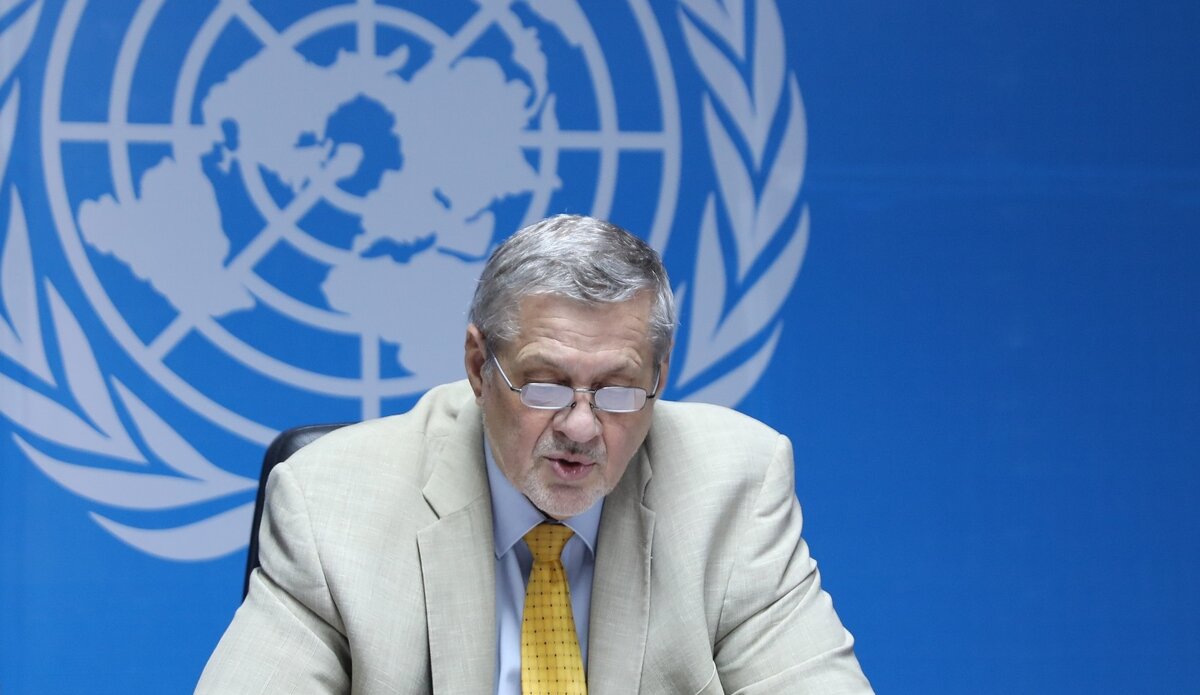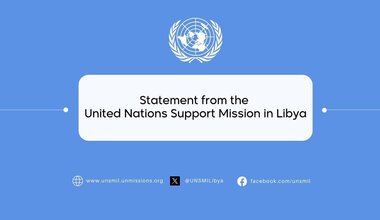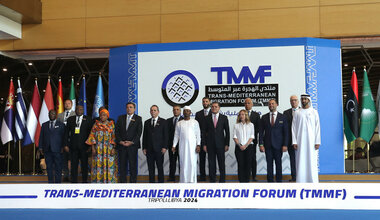Remarks of the UN Special Envoy for Libya, Ján Kubiš, League of Arab States Meeting of Foreign Affairs Ministers - Cairo, 9 September
Excellencies,
Dear Secretary-General,
At the outset, I would like to thank the League of Arab States for inviting me to address this important meeting with some updates on Libya, to complement what Foreign Minister Mangoush might like to say about the developments in the country.
In the past days, I held consultations in Libya with a wide range of actors, leaders, officials, including Her Excellency FM Mangoush, and some representatives of civil society groups, to discuss how to safeguard and advance the course to national inclusive, free, and fair parliamentary and presidential elections this December and progress on other files – security, economic and human rights/humanitarian established and followed by the Berlin process. All interlocutors reiterated their commitment to holding elections on 24 December, and the Government has provided the necessary funding for the HNEC and works on the security measures to ensure safe conduct of the elections.
In the meantime, the House of Representatives (HoR) is in the process of finalizing electoral laws for both presidential and parliamentary elections. I was informed by HOR President Mr.A.Saleh that the presidential electoral law was already adopted as law No.1/2021, while the parliamentary elections can be organized on the basis on the existing law with possible amendments that could be considered and approved within the coming two weeks.
Against this backdrop, the High National Elections Commission (HNEC) has been continuing with the preparations for the elections that can be done in the absence of the legislative framework, including voter registration that has reached a total of 2.86 million registrants (43% women), work on registration for out of country voting is on-going in consultation with Ministry of Foreign Affairs of Libya and will require cooperation and support from countries hosting Libyan citizens. As confirmed by HNEC, the GNU has allocated sufficient funding for the commission to enable the preparations and organization of elections on 24 December. The UN continues to provide technical support to HNEC.
In order to help ensure integrity of the electoral process, international and domestic observation of the whole process is critical. I urge all member states and regional organizations including LAS and its members to send observation teams, in coordination with Libyan authorities and institutions, notably HNEC, and the Ministry of Foreign Affairs when the time will come.
Excellencies,
On 8 July, I delivered the report of the international financial audit to the Presidency Council in the presence of the Prime Minister and the Governor and Vice Governor of the Central Bank of Libya (CBL). The main finding of the audit is that the unification of the Central Bank of Libya is no longer simply recommended but required.
Today the Central Bank Governor and Deputy Governor intend to brief the Berlin process IFCL Economic Working Group co-chaired by Egypt to provide an update on the plan and initial steps to implement the recommendations and proceed with the unification process. The GNU and PC have confirmed their willingness to support this process.
Excellencies,
On the security front, the persistent efforts of the 5+5 JMC led recently to the reopening of the Misrata-Sirte Coastal Road, with the support of UNSMIL and UNMAS. The people of Libya warmly welcomed this development, which brings clear benefits for all Libyans.
Nevertheless, the continued presence of mercenaries, foreign fighters, and foreign forces remains a cause of concern for Libya and the international community, including neighbouring countries. The Security Council in a number of resolutions notably in UNSCR 2570 and recent statement on 15 July, strongly urged all Member States, all Libyan parties and all relevant actors to respect and support the full implementation of the 23 October 2020 ceasefire agreement, including through the withdrawal of all mercenaries, foreign fighters and foreign forces from Libya without delay.
The preparations for the deployment of an initial first group of UN ceasefire monitors are underway. The first group will deploy in the coming weeks to support the Libyan-led and Libyan-owned ceasefire monitoring mechanism (LCMM).
To ensure gradual buildup towards full implementation of the ceasefire agreement, the 5+5 JMC intends to develop an action plan for a sequenced and a phased, verifiable withdrawal, starting with the withdrawal of mercenaries and foreign fighters. The intention is to consult this plan with the respective international partners, including Libya neighbors and seek their support and cooperation. We also support efforts led by FM Mangoush on the Stabilization Initiative that has similar objectives. This Libya-led and owned initiative intends to help operationalize the CFA and Berlin Conferences conclusions. We are also ready to support the Libya led process of DDR and SSR for the stabilization of the country and the wider region, to work on this with Libya and international partners, including countries of the region, notably neighbors of Libya.
Excellencies,
At the initiative of the People’s Democratic Republic of Algeria, an important and timely ministerial meeting of the neighboring countries with Libya was held in Algiers, from 30-31 August 2021.
The ministers discussed ways and means to enable neighboring countries to effectively support the ongoing efforts under the auspices of the United Nations with the aim of reaching support for the political track that ends differences and preserves the security and stability of all neighboring countries and requested involve them in all regional and international meetings related to the crisis.
The Ministers reaffirmed the central role of the mechanism of the neighboring countries in support of the UN-facilitated process in Libya and the highest importance of consultation and work on coordination between the Joint Military Commission 5+5 and the Libyan neighbors on the issue of the withdrawal of mercenaries and foreign forces to establish an effective mechanism and process between the Libyans and neighboring countries.
The Ministers also stressed the importance of ensuring enhanced coordination, synergy and integration between the efforts of the United Nations, the African Union, the League of Arab States and the European Union, which work closely with neighboring countries, with the aim of avoiding multiple competing efforts and tracks in support of the preparatory phase of a comprehensive solution in Libya.
The ministers welcomed the proposal of the Arab Republic of Egypt to host the next meeting of the foreign ministers of the neighboring countries of Libya at a date to be agreed upon later.
Excellencies,
Withdrawal of foreign fighters and armed groups has to be accompanied by scaled-up efforts across Libya and the wider region to address root causes of instability, notably through inclusive reconciliation, peacebuilding, and development programmes with a focus on the youth, on women empowerment. Coordinated, complementary measures and programmes supported and co-financed by the international community coupled with resolute international action against criminal traffickers of people, weapons and drugs, and cooperative measures to enhance control in the border areas, including integrated border control and management must be a part of the solution if it is to be durable and sustainable. Here partnership of the UN, LAS, AU and EU is critical, as is from the broader perspective the coordination role of the Quartet of these organizations as highlighted in its last meeting hosted by LAS.
Excellencies,
I would like to reiterate the UN’s long-held position that Libya is not considered a safe port of disembarkation for migrants and refugees.
The international community needs to increase its collective and bilateral engagement to address the causes fueling irregular movements of people and to provide legal pathways to avoid the continuing loss of lives on the central Mediterranean route.
Such arrangements or agreements should reflect Libya and neighboring countries’ responsibility to uphold the international principle of non-refoulement that includes halting all collective expulsions of migrants and asylum-seekers, while facilitating voluntary humanitarian evacuation, return, and resettlement flights. We hope to see soon a resumption of such flight, that have been unfortunately recently again halted and urge the respective Libyan authorities to facilitate that without further delay, in cooperation with IOM and UNHCR.
Excellencies,
It is important that Libya and neighboring countries manage and control their borders. Positive developments in this regard are bilateral agreements currently being negotiated between Egypt and Niger with Libya towards managing migration flows. At the same time efforts to sign and operationalize bi-lateral and multilateral agreements to promote security and cross-border cooperation between countries sharing a common border with Libya are essential in maintaining regional security, fostering economic development, and building trust for closer cooperation among themselves and with Libya. The border management Quartet Agreement between Libya, Sudan, Chad, and Niger is a positive example of multilateral cooperation in securing common borders and tackling trans-national crime, violent extremism, activities of armed groups.
As cooperation continues to develop, the potential of such agreements including bilateral agreements with Libya will continue to build peace and stability in the region.
Excellencies,
Libya is at a critical stage where the significant achievements and progress of the past period must be consolidated to continue the political transition towards a unified, fully sovereign, peaceful, and stable country. As stated recently in Algeria by the LAS SG Mr.Aboul Gheit, the momentum of these developments must be maintained so that the sought-after outcomes can be reached. This is important not just for the Libyan people but for the region as a whole. Continued, concerted and aligned efforts of neighboring and regional countries and their organizations as well as the broader international community are essential to support and encourage the various sides and parties in Libya to work together for the unification of State institutions and the full implementation of the ceasefire agreement, deliver needed services, protect and promote human rights, justice, and accountability for Libyans and migrants, and set the stage for holding the parliamentary and presidential elections on 24 December.
Thank you for your attention.
 United Nations Peacekeeping
United Nations Peacekeeping UN
UN








